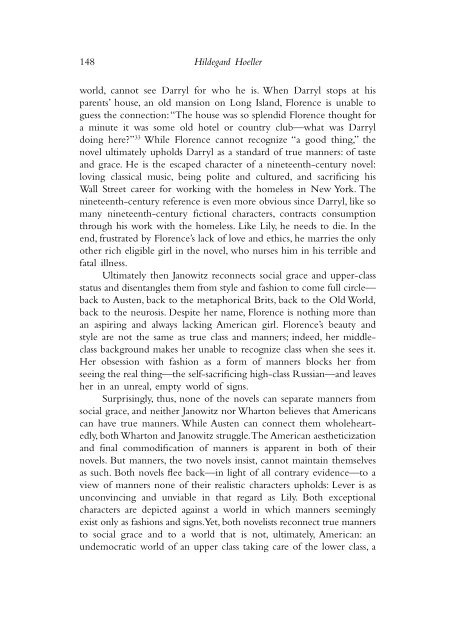Create successful ePaper yourself
Turn your PDF publications into a flip-book with our unique Google optimized e-Paper software.
148 Hildegard Hoeller<br />
world, cannot see Darryl for who he is. When Darryl stops at his<br />
parents’ house, an old mansion on Long Island, Florence is unable to<br />
guess <strong>the</strong> connection: “The house was so splendid Florence thought for<br />
a minute it was some old hotel or country club—what was Darryl<br />
doing here?” 33 While Florence cannot recognize “a good thing,” <strong>the</strong><br />
novel ultimately upholds Darryl as a standard <strong>of</strong> true manners: <strong>of</strong> taste<br />
and grace. He is <strong>the</strong> escaped character <strong>of</strong> a nineteenth-century novel:<br />
loving classical music, being polite and cultured, and sacrificing his<br />
Wall Street career for working with <strong>the</strong> homeless in New York. The<br />
nineteenth-century reference is even more obvious since Darryl, like so<br />
many nineteenth-century fictional characters, contracts consumption<br />
through his work with <strong>the</strong> homeless. Like Lily, he needs to die. In <strong>the</strong><br />
end, frustrated by Florence’s lack <strong>of</strong> love and ethics, he marries <strong>the</strong> only<br />
o<strong>the</strong>r rich eligible girl in <strong>the</strong> novel, who nurses him in his terrible and<br />
fatal illness.<br />
Ultimately <strong>the</strong>n Janowitz reconnects social grace and upper-class<br />
status and disentangles <strong>the</strong>m from style and fashion to come full circle—<br />
back to Austen, back to <strong>the</strong> metaphorical Brits, back to <strong>the</strong> Old World,<br />
back to <strong>the</strong> neurosis. Despite her name, Florence is nothing more than<br />
an aspiring and always lacking <strong>American</strong> girl. Florence’s beauty and<br />
style are not <strong>the</strong> same as true class and manners; indeed, her middleclass<br />
background makes her unable to recognize class when she sees it.<br />
Her obsession with fashion as a form <strong>of</strong> manners blocks her from<br />
seeing <strong>the</strong> real thing—<strong>the</strong> self-sacrificing high-class Russian—and leaves<br />
her in an unreal, empty world <strong>of</strong> signs.<br />
Surprisingly, thus, none <strong>of</strong> <strong>the</strong> novels can separate manners from<br />
social grace, and nei<strong>the</strong>r Janowitz nor Wharton believes that <strong>American</strong>s<br />
can have true manners. While Austen can connect <strong>the</strong>m wholeheartedly,<br />
both Wharton and Janowitz struggle. The <strong>American</strong> aes<strong>the</strong>ticization<br />
and final commodification <strong>of</strong> manners is apparent in both <strong>of</strong> <strong>the</strong>ir<br />
novels. But manners, <strong>the</strong> two novels insist, cannot maintain <strong>the</strong>mselves<br />
as such. Both novels flee back—in light <strong>of</strong> all contrary evidence—to a<br />
view <strong>of</strong> manners none <strong>of</strong> <strong>the</strong>ir realistic characters upholds: Lever is as<br />
unconvincing and unviable in that regard as Lily. Both exceptional<br />
characters are depicted against a world in which manners seemingly<br />
exist only as fashions and signs. Yet, both novelists reconnect true manners<br />
to social grace and to a world that is not, ultimately, <strong>American</strong>: an<br />
undemocratic world <strong>of</strong> an upper class taking care <strong>of</strong> <strong>the</strong> lower class, a
















